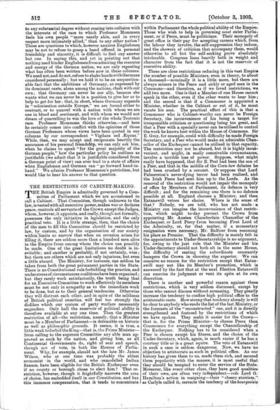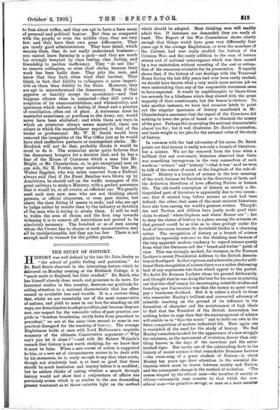THE RESTRICTIONS ON CABINET-MAKING. T HE British Empire is admittedly governed
by a Com- mittee of Parliament which we' are accustomed to call a Cabinet.. That Committee, though unknown to the law, is vested with all executive power, makes war or declares peace, controls all servants of the Crown except the Judges, whom, however, it appoints, and really, though not formally, possesses the only initiative in legislation, and the only practical veto. It is a little strange, then, that the choice of the men to fill-this Committee should be restricted by law, by custom, and by the organisation of our society within limits so narrow that when an occasion arises for filling it, there are seldom more than a hundred men alive in the Empire from among whom the choice can possibly be made. One of the great limitations no doubt is in- evitable; and another is probably, if not certainly, wise ; but there are others which are not only injurious, but even a little absurd. The Ministry, for instance, can seldom be taken from both the great permanent parties in the State. There is no Constitutional rule forbidding the practice, and under stress of circumstances coalitions have been organised ; but they rarely work satisfactorily, the truth being that for an Executive Committee to work effectively its members must be not only in sympathy as to the immediate work to be done, but as to their general tendencies. Otherwise they will distrust each other, and in spite of the mildness of British political enmities, will feel too strongly the dislikes which our system of party warfare necessarily engenders. Only half the reservoir of political ability, is therefore available at any one time. Then the greatest restriction of all—the restriction, namely, that a Minister must be a Member of Parliament—is defensible on historic as well as philosophic grounds. It seems, it is true, a little weak to forbid the King—that is, the Prime Minister— from calling to the supreme Committee any able man ap- proved as such by the nation, and giving him, as all Continental Governments do, right of seat and speech, though not of vote, in both the Houses of Parlia- ment. Why, for example, should not the late Kr. James Wilson, who at one time was probably the ablest economist in the -world, and who .remodelled Indian finance, have been eligible for the British Exchequer even if no county or borough chose to elect him ? That re- striction, 'however, though it frightfully narrows the area a choice, has embedded itself in our Constitution, and has this 'immense compensation, that it tends to concentrate within Parliament the whole political ability of the Empire. Those who wish to help in governing must enter Parlia- ment, or if Peers, must be politicians. Their monopoly of great office is their pay for accepting careers which, from the labour they involve, the self-suppression they induce, and the showers of criticism that accompany them, would otherwise to all but the self-seeking prove absolutely intolerable. Congress loses heavily both in weight and character from the fact that it is not the reservoir of executive ability.
These are close restrictions reducing in this vast Empire the number of possible Ministers, even in theory, to about a thousand—nominally it is a little more, but there are always minors in the Peers and sickly or aged men in the Commons—and therefore, as if we • loved restrictions, we add two more. One is that a Member of one House cannot speak in the other, even if the other wants to hear him ; and the second is that if a Commoner is appointed a Minister, whether in the Cabinet or out of it, he must vacate his seat. The practical effect of this is that a Commoner who is Cabinet-worthy can never- be Foreign Secretary, the inconvenience of his being a target for irresponsible criticism or questioning being too great, and that a Peer with a specialty never can be utilised to control the work he knows best within the House of Commons. Sir E. Grey, for example, could with difficulty be made Foreign Secretary, and a Peer who would make an admirable Chan- cellor of the Exchequer cannot be utilised in that capacity. The restriction may not be absurd, but it is highly incon- venient, and might, in easily conceivable circumstances, involve a terrible loss of power. Suppose, what might easily have happened, that Sir R. Peel had. been the son of a Peer, and that in the middle of the Corn-law debates he had been crushed by a coronet. Or suppose that Lord Palmerston's never-dying terror had been realised, and the Irish Peers had sent him up to the Lords. As the removal of the restriction would not impair the monopoly of office by Members of Parliament, its defence is very difficult ; and for the remaining one there is no defence possible at all. England chooses a Minister, and then Eatanswill 'vetoes her choice. Where is the sense of that ? Nobody, we are told, who has not made a Ministry can imagine the inconvenience of that restric- tion, which might to-day prevent the Crown from appointing Mr. Austen Chamberlain- Chancellor of the Exchequer, or Lord Percy from becoming First Lord of the Admiralty, or, for that matter, if a momentary resignation were necessary, Mr. Balfour from resuming his place as Premier. That the difficulty is mainly felt in the appointments to Under-Secretaryships is no argument, for, owing to the just rule that the Minister and his Under-Secretary should not both sit in the same House, the difficulty of seating the subordinate constantly hampers the Crown in choosing the 'superior. We can conceive no reason for the restriction except that Eaten- swill may not like its Member's promotion, which is answered by the fact that at the next Election Eatanswill can exercise its judgment or vent its spite at its own discretion.
There is another and powerful reason against these restrictions, which is very seldom discussed, except by those who cannot discuss without screaming. They greatly increase the tendency to confine high political office to the aristocratic caste. How strong that tendency already is will be clear to anybody who reads the list of the last Ministry, or the forecasts of the " reconstructed " one, and it is directly strengthened and fostered by the restrictions of which we have spoken. They make it easier for the Crown— that is, for the Prime Minister—to choose Peers than Commoners for everything except the Chancellorship of the Exchequer. Nothing, has to be considered when a Peer is chosen except his• fitness, and the choice of the Under-Secretary, which, again, is much easier if he has a courtesy title or is a great squire. The veto of Eatanswill in such a case. is seldom dangerous. Now, we have no objection to aristocrats as such in politieal office. As our history has given them to us, made them rich, and secured them popularity with the masses, it is most useful that they should be tempted to enter the service of the State. Moreover, like every other class, they have good qualities' of their own, are often very independent—vide Lord G. Hamilton's action in resigning—their "cheery stoicism,". as Carlyle called it, corrects the tendency of the bourgeoisie: to fuss about trifles, and they are apt to have a keen sense of -personal and political honour. But then as compared with the people, or even the middle class, they are very few, and they have their own great differences. They are rarely good administrators. They hate detail, which Wearies them, they do not really understand business— you cannot learn farming in a park—and they are much too strongly tempted by class feeling, clan feeling, and friendship to pardon inefficiency. They "do not like" to remove colleagues, or even chief clerks, because their work has been badly done. They pity the men, and know that they have often tried their hardest. They think, in fact, that fidelity to colleagues is more impera- tive on them than fidelity to the State. Moreover, they are apt to misunderstand the democracy. Even if they approve or heartily accept its ascendency—and that happens oftener than is suspected—they still retain a suspicion of its unaccountableness, and whimsicality, and ignorance which induces a feeling of dread and a practice of conciliation, often out of place. A statesman must be masterful sometimes, or purchase in the Army, say, would never have been abolished ; and while there are ways in which an aristocrat always seems masterful, there are others in which the masterfulness required is that of the trader or professional. Mr. W. H.' Smith would have removed the incapables of the War Office just as he would have shed ineffective partners or incompetent clerks. Mr. Brodrick will not do that, probably thinks it would be cruel to do it. The aristocrat never quite believes that the democracy hungers for a decisive lead, and he has a fear of the House of Commons which a man like Mr. Bright, or Mr. Chamberlain, or, to put exceptional men on one side, Sir H. Fowler, never entertains. The late Mr. Walter Bagehot, who was miles removed from a Radical, always said that if the Front Benches were blown up by Anarchists, he should call on the traffic managers of the great railways to make a Ministry, with a perfect assurance that it would be, at all events, an efficient one. 'We greatly need such men now, men who are not thinking about persons, or official etiquettes, or even past claims, but about the close fitting of means to ends, and who are apt to judge rather by results than by the industry or devotion of the man who is trying to attain them. If will be well to widen the area of choice, and the first step towards widening it is to remove all restrictions not proved to be absolutely necessary. The hundred or so of men among whom the Crown has to choose at each reconstruction may all be unobjectionable, but they are too few. There is not enough mud to winnow for the golden grains.



























































 Previous page
Previous page